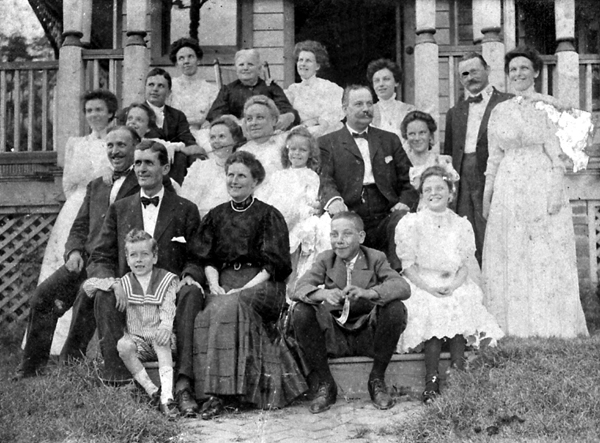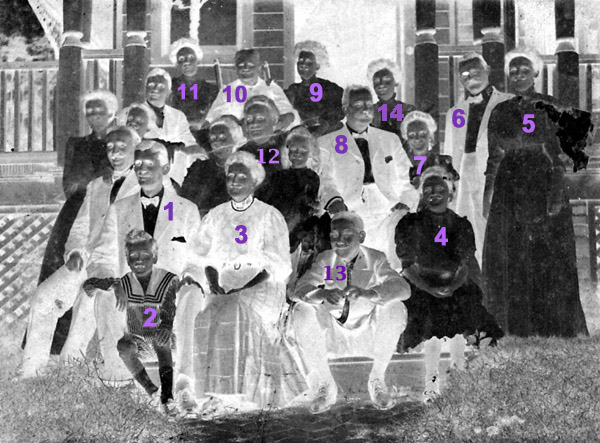

  |
|

|
Name: A Family Gathering at The Terrace Date: ca. 1907 Image Number: Roll4Neg12A Comments: Dr. David Pinckney Powers was the deceased patriarch of this family shown above in 1907 at The Terrace. To learn more about the Powers family, use the image below as a guide to the names of family members. (1) Andrew Gilbert Bell, Sr., was born ca. 1861 in Rockingham County, Virginia and married
Annie Powers (see #3) in Scottsville. They were the parents of a son, Andrew Gilbert Bell, Jr. (see #2). Andrew
died in Charlottesville on October 4, 1951, and is buried in Woodbine Cemetery, Harrisonburg, Virginia.  To learn more about the Powers family's influencing role in Scottsville, read the below article by Ruth Klippstein, which was published in the Scottsville Monthly in 2012: Parlor Games and Tricks
by Ruth Klippstein Scottsville Monthly, February 17 - March 15, 2012 The small town web of Scottsville - connecting the elite and middle class families, buildings, and social events in a cohesive community - is exemplified by the above family photograph. Taken by William Burgess around 1912 and archived by the Scottsville Museum, it shows the Powers, Blairs, and Bells on the front steps of The Terrace on Jackson Street. "They were certainly leading families of Scottsville," says Robert Spencer. "It's a great story, the story of The Terrace." This two-story Victorian house was built for Dr. David Pinckney Powers and his wife, Sarah Staples Powers. The Powers' house, from 1840, is next door to the east and is noted by Susan DeAlba's "Country Roads, Albemarle County," for its "original beaded weather-boarding." David Powers first ran "one of Scottsville's smaller, lesser-known hotels," according to Spencer. Powers was the first Albemarle County school superintendent from 1870 until he died 30 years later, "a quiet firm man of great character," said Virginia Moore. Sarah Staples Powers was part of the long-established Staples family in Scottsville that donated the land for the 1831 Episcopal Church on Glendower Road. They married in 1853 and were the parents of two sons and five daughters, the extended family all living in The Terrace, a "palace," Spencer says. The boys were William and Phillip Powers. The girls were involved in many activities in town and are mentioned by Susan Hill Dunn in her book, With Love from Mother (1934) at the Local History Center of the Scottsville Library: "The [Powers] daughters you all know: Miss Annie Bell, Miss Susie Blair, Miss Met Powers, and Miss Lucy Powers. They've been our friends always." This 'first family,' as Spencer calls them, was the topic of an early 1890's article in the Scottsville Courier, cut out by her ;mother, one supposes, and saved by Susie Blair in an undated scrapbook now in the Barclay House of the Scottsville Museum. Pasted in with a 1923 article on commencement exercises at the University of Richmond and one on a poetic parody of rationing is "Miss Powers' Potato Walk," the text of which Virginia Moore uses to describe the "easier" conditions in town as Reconstruction ended. "A very novel game introduced in Scottsville, VA" is the second headline of this story: "September 4: [Special] For some weeks, Scottsville has been unusually happy! A number of enjoyable entertainments have been given. But the 'event' of the season was a party given at the Powers house by Miss Lucy Powers last evening. The tables were beautifully decorated with flowers, fruits, and melons, and the rooms and hallways with evergreens and Japanese lanterns." "The feature of the evening was a 'potato walk,' which was most novel and amusing. To take a large knotty potato from the floor in a small teaspoon in a given length of time and carry it the entire length of a room may seem easy, but it is not." There follows a list of the prize winner and losers, and a description of the dresses worn by the women: Miss Lucy Powers, very pretty in a pale blue gown, baby waist, white lace and ribbon; Miss Marietta Powers, a debutante, blue gown and ribbons; Miss Rose Farrar, in blue veiling, white lace; Miss Theodora Blair, cream dress and flowers; Miss Auralia Blair, lovely in blue; Miss Serena Hamner, in white dress, blue trimmings, very graceful; Miss Mary Bull, white mull (similar to muslin) and ribbons, no ornaments, very pretty; Miss Jennie Patteson, black lace; Miss Nannie Davis, black net and amber, handsome...Miss Grimsley, handsome red China silk, bouquet of poppies... Miss Susie Powers, white muslin, old lace, diamond ornaments, extremely pretty..." The men attending are mentioned by last name, but not otherwise described. Their names are a roll call of Scottsville's up and coming, or already arrived: Harris, Blair, Bell, Carter, Moore, Tompkins, Farrar, and Hill. Might they have worn stiff, high collars and three- piece suits, then gaining popularity? Or in keeping with the women's diamonds and old lace, were they more formally attired with dark tail coats and white bow ties? Did they leave walking sticks and top hats at the door? I like the idea of tail coats for the Potato Walk. This parlor game, apparently never played before in town, was one of many offered in books such as "Games for Everybody," which in the early 1900's demonstrated that children's games could be adapted to adults; included were Tableau Vivant and Forfeits. This type of fun was evolving from the harsh days of the Civil War and its aftermath, and from earlier social stereotypes that allowed children to play games indoors, but not adults. These parlor games, offered in a special formal room set aside for entertaining, clearly shows a society with more leisure time on its hands. The workers were working, of course--the farmers, railroad hands, lumber and coal men, the many domestic servants and laundresses--but the wealthy were, when not reading, sketching or playing music and games. "Blind Man's Bluff; Charades; Pass the Slipper; Squeak, Piggy, Squeak--these were somewhat boisterous, sometimes creative activities we still might play today, like Musical Chairs. They do have an aspect, in a more circumspect society, of 'decorous titillation,' as the website, Victoria's Past, points out. Squeak, Piggy, Squeak, for example, involved a blindfolded player who the Farmer turned around until the player became disoriented in the center of a circle of seated players. The Farmer drops a pillow in the lap of one, sits on it, and then commands, "Squeak, piggy, squeak," and tries to guess in whose lap he is sitting by the sound. Not quite 'Spin the Bottle,' but on the way! As the Foxfire Book of Appalachian Toys and Games (1993) notes, "Nothing levels people as effectively as a good laugh at themselves and others in the same funny situation." The Courier article did not say if Mr. Frank Hill, awarded the booby prize in the Potato Walk at Miss Power's house, was laughing. Following Scottsville history down the years, we find a number of Lucy Powers' party-goers pairing off and marrying. Miss Lucy did not. 'The Famous Miss Lucy,' Spencer calls her; she ran a nursery school with a teaching friend who lived with the family at The Terrace, Miss Kate Stith; and Miss Met -- Marietta Powers -- her aunt, remained single and worked "at the tiny little library next door to the Methodist Church," Spencer says, and as the secretary to Scottsville banker, Jacinto Pereira. Annie Powers married A. Gilbert Bell, uniting those families; and Susie Powers--she of the white muslin, old lace, and diamonds--married Scottsville's dentist, Dr. Joseph Blair, whose office was on the second floor of a now-vanished frame building on the south side of Main Street, next to Mink Creek. Blair's ad ran in a 1911 Scottsville Enterprise: "will visit Alberene, Schuyler, and Esmont." He was chairman of the Albemarle County School Board for 37 years and a member of the Scottsville Town Council. Joseph Blair is remembered in John C. Hill's memoir, Recollection of Scottsville, 1870-1886, as "embodiment of everything that a young man should be... [He] was a clerk in the Harris [grocery] Store, and his salary was $30.00 a month [but] he had his heart set on becoming a dentist." To make enough money for medical school tuition, Hill remembers, Blair asked his friend, Thomas Staples Martin, "a power in politics long before he became United States Senator," to help him get a job as a railway clerk, which gave him "a run from Charlottesville to Hinton, West Virginia... Joe saved money fast on that job..." After graduating from University of Maryland dental school, Blair took his friend Hill as his "first patient--he filled a tooth for me." Some of Blair's dental tools came to Robert Spencer from Hayden Anderson who found them in the attic of The Terrace when he bought that house. Susie Powers Blair's daughter was always known in Scottsville, with great respect, as "Miss Susie." Susie Nicholas Blair, 1896-1980, was remembered by Virginia Moore in a Scottsville Baptist Church history supplied by Spencer, as "growing up in a large family--parents, aunts, uncles, cousins--this 'only child,' unspoiled, must have been, as prophecy of the future, an earnest young person with a quick sense of humor." She taught English, drama, and Shakespeare at Hollins College and was well-loved in Scottsville as a member of the Scottsville Baptist Church where she directed the Christmas pageant; was original member of the Board of Trustees of Scottsville Museum; an helped stage the ambitions Bicentennial Pageant with Spencer and Randolph Phillips. "Wise," Virginia Moore said, "with the wisdom which comes not from books...but from life itself." Susie is also remembered by Virginia Moore for many of the games that were played in her childhood, including 'Drop the Handkerchief' outdoors at Cliffside, Virginia's home. Miss Susie, last of the family to live in The Terrace, stipulated that it was to remain the home of Charlie Lenaham, who with his mother had been servants there and "took wonderful" of the Power and Blair families," says Spencer. The Scottsville Museum's website describes The Terrace as a "storehouse of artifacts and memories" of Scottsville and these intertwined families. As author, Michael Ondaatje, writes, "The past is always carried into the present by small things." Dental equipment, a corsage of poppies, and a Potato Walk." Copyright © 2018 by Scottsville Museum |
|
|
|
Museum
Archive
Business
Cemeteries
Church
Events
Floods
For Kids
Homes
Portraits
Postcards
School
Transportation
Civil War WWII Esmont Search Policy |
||||
|
Scottsville Museum · 290 Main Street · Scottsville, Virginia 24590 · 434-286-2247 www.avenue.org/smuseum · info@scottsvillemuseum.com Copyright © 2018 by Scottsville Museum |
||||